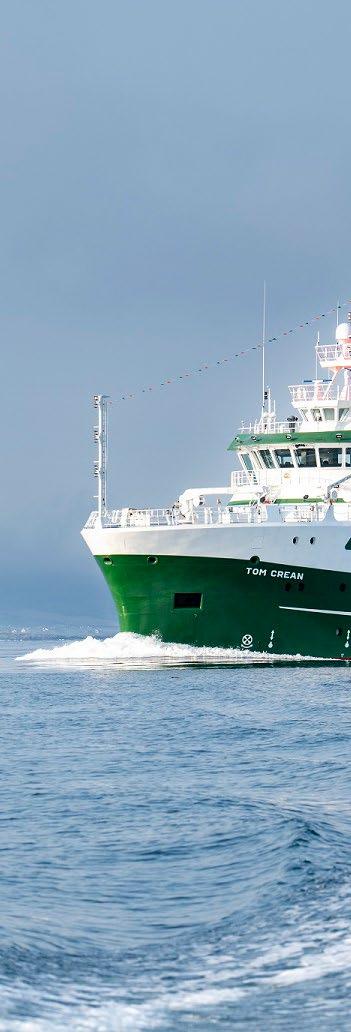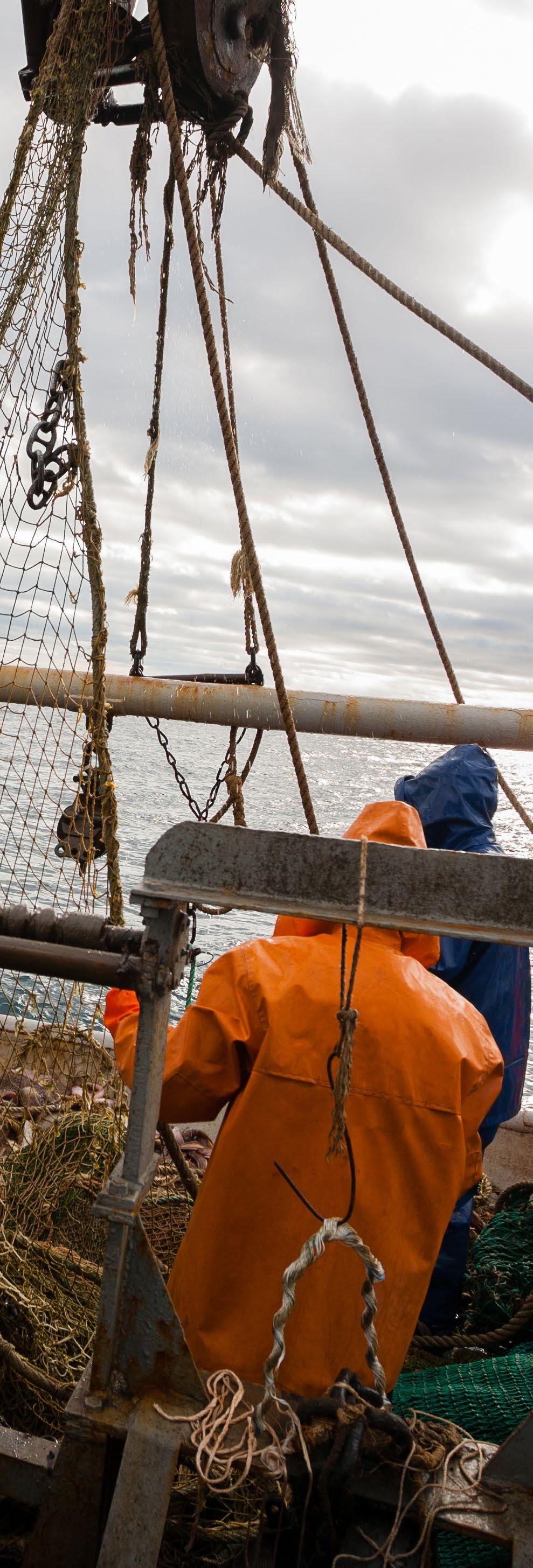

SCIENCE PLAN

International Council for the Exploration of the Sea (ICES) Conseil International pour l’Exploration de la Mer (CIEM)
Recommended format for purpose of citation: ICES. 2025. Science Plan. https://doi.org/10.17895/ices.pub.28238132
This document has been produced under the auspices of the International Council for the Exploration of the Sea.
© 2025 International Council for the Exploration of the Sea
CC-BY 4.0 - This work is licensed under the Creative Commons Attribution 4.0 International License (CC BY 4.0).


ICES SCIENCE PLAN
Introduction
ICES priorities and ecosystem challenges
Interdisciplinary and transdisciplinary science
Operationalizing the Science Plan
Themes
Marine ecosystem science
Impacts of human activities
Observation and exploration of the seas and ocean
Emerging techniques and technologies Food from the sea
Science for ecosystem-informed advice for our seas and ocean
ICES is a world-leading scientific organization, effectively meeting societal needs for impartial evidence on the state and sustainable use of our changing seas and ocean. ICES science is the evidence base to inform advice on how to manage and adapt to the challenges from climate change, biodiversity loss, pollution, and pressures from human activities.
ICES science supports national priorities and the needs of our Member Countries and partner intergovernmental organizations for scientific advice. It advances knowledge of aquatic ecosystems, human activities, the interaction of humans and the ocean, food from the sea, and ocean observation. It informs on conservation and restoration measures and supports technological advances.
ICES science covers a wide range of aquatic science fields, from disciplinary research in the natural and social sciences and the humanities to the application of interdisciplinary and transdisciplinary research approaches. ICES uses a unifying concept of the oceans and coasts as social–ecological systems (SES). Our Science Plan presents the research themes and how interdisciplinary and transdisciplinary science can be conducted and taken forward into advice.



The aim is to carry out our science in a diverse, equitable, and inclusive work environment, supporting minority groups and early career scientists as well as scientists from under-represented groups. We also aim to increase the visibility and impact of our science, engage new scientists, increase training and networking opportunities, and strengthen collaboration with regional and global partners.
ICES Science Plan was developed through an inclusive and consultative process with our community of scientists. This process drew on expertise throughout our network and constituent bodies, a review of the scientific priorities of Member Countries, and a review of national and international policy drivers and science opportunities for ICES.
The target audience for this plan is the science community in ICES Member Countries and beyond. Our science includes a wide range of disciplines and experience and aims to include various knowledge systems.















ICES priorities and ecosystem challenges
ICES Science Plan comprises seven themes, as detailed on pages 12–25. These themes broadly follow those in the 2020–2024 Science Plan. The tasks within each theme were developed through a broad consultation and review process. Contributors included our science community, through our many expert groups, Member Countries, and advice requesters and observers. The plan thus represents an overview of the science that ICES does and the needs of our stakeholders.
ICES recognizes a range of critical challenges to marine socialecological systems (SES):
• Climate change – impacts on marine ecosystems and human activities; adaptation and mitigation responses
• Biodiversity – conservation and restoration
• Sustainable food from the sea – fisheries and aquaculture, large- and small-scale
• Pollution – including contaminants, plastics, and eutrophication
• A more crowded marine space – multiple use marine spatial planning (MSP)
• The human dimension – human impacts on marine ecosystems and the benefits provided by such ecosystems
Additionally, these challenges interact. For instance, warming due to climate change can affect biodiversity and food security. Equally, improving food production, e.g. through fishing, can negatively impact biodiversity. The development of offshore wind farms or establishment of marine protected areas (MPAs) may affect fishing opportunities and have unknown biodiversity impacts.
These interactions then require a transdisciplinary approach to our science. Therefore, our priority is to foster transdisciplinary research drawing from some or all of the seven themes.
We already have a wealth of more specialized research activities within ICES, and this will be maintained by forging wider scientific partnerships. However, the focus for the next five years will be to help create synergies between those activities that can help address the complex and interactive challenges detailed above.


Social–ecological systems (SES)
Social–ecological systems (SES) are complex adaptive systems in which people and nature are inextricably linked and in which both the social and ecological components exert strong influence over outcomes. The social dimension includes actors, institutions, cultures, and economies, including livelihoods. The ecological dimension includes wild species and the ecosystems they inhabit.
Ecosystem-based management (EBM) and ICES Framework for Ecosystem-Informed Science and Advice (FEISA)
Ecosystem-based management (EBM) can be defined as an integrated approach that incorporates the entire ecosystem, including humans, into resource management decisions and that is guided by an adaptive management approach. ICES has developed FEISA for the inclusion of a full variety of data, knowledge, methods, and syntheses that are required to deliver practical and operational EBM and ecosystem-informed advice. FEISA integrates and operationalizes qualitative, semi-quantitative, and quantitative indicators in context-based and objective-based risk assessments that form the foundation of ecosystem-informed advisory products.
ICES places interdisciplinary and transdisciplinary research at the heart of its science. Interdisciplinary activities, such as the network sessions held at ICES Annual Science Conference (ASC) or in topical workshops, help to connect the different working groups and our community, focusing on integrated research questions. ICES Stakeholder Engagement Strategy and its implementation plan guide our collaboration with stakeholders. The strategy is designed to help include experiential knowledge in the work of our working groups and workshops, particularly that of non-academic and non-scientist stakeholders, individuals, and communities.
ICES science has a regional focus but global reach and relevance. To ensure we bring the best expertise to our work, we foster scientific cooperation with regional and global partners through collaborative projects, networks, and training to shape and advance marine science and advice. We jointly develop and organize groups and symposia, and our relationships with partners extend the reach of our science into the Mediterranean Sea, Black Sea, Arctic Ocean, North Pacific Ocean, and globally. Until 2030, the UN Decade of Ocean Science for Sustainable Development will help support such partnerships globally.
Horizon scanning Interdisciplinary and transdisciplinary science Building partnerships
Science and policy are constantly evolving, and a Science Plan that is meant to be valid for five years should capture current science needs and priorities and aim to be adaptable to respond to emergent policy and science challenges. Working groups will continuously update their priorities and science, and their three-year Terms of Reference (ToR) are a key opportunity for horizon scanning. Another opportunity is the Meeting of the Chairs of ICES Working Groups (WGCHAIRS), which is the main forum for working group chairs to exchange on new developments, and in which a standing agenda item on horizon scanning offers the opportunity to identify emerging science areas, their relevance for ICES, and how they can be considered. Finally, the future is best scanned by earlier career researchers being encouraged to integrate and bring in new ideas and knowledge.

Operationalizing the Science Plan
Our approach
Our science is principally conducted through our working groups and workshops. We invite the wider marine science community to our ASC and to our co-sponsored symposia. We also engage with many global fora, including the UN Ocean Conference and UN Ocean Decade activities. We share methods and knowledge through our training programme, the InterDis summer school, and topical workshops.
Science work and activities are supported by our Secretariat, helping to make ICES an efficient, collaborative, respectful, and rewarding working environment. The Secretariat helps to increase the visibility of, and wider access to, our science, data, and advice. It also helps to promote the use of our science outputs beyond ICES, thus increasing our impact, recognition, and reputation for robust and useful science.
We recognize the value of other knowledge systems, such as the experiential knowledge of different users, traditional owners of land and resources, and Indigenous and local communities. This knowledge can usefully contribute to our knowledge base and understanding. ICES actively engages with such groups, encouraging a dynamic and two-way exchange of knowledge, and supports transdisciplinary approaches to make best use of this information.
Achieving
The implementation of the Science Plan is monitored by tracking how the ToR of groups, symposia, and publications are linked with the tasks outlined in this plan and by measuring and reviewing the outcomes. Most of these outcomes are freely available in ICES Library and are listed in the ICES science publications section on page 11. Progress with implementation is reported to, and reviewed by, our governing body, ICES Council, to ensure we are contributing effectively to ICES vision and mission.


ICES Code of Ethics and Professional Conduct
Our Code of Ethics and Professional Conduct is the basis of how we want to work together in ICES. It details our core values, provides guidance on good scientific practice, identifying and handling actual, potential, or perceived Conflicts of Interest, defines the standard for participant behaviours in our activities, and sets the responsibilities of those contributing to our work, including environmental responsibilities.
ICES science publications
These include
• Scientific reports
• Cooperative Research Reports (CRRs)
• Techniques in Marine Environmental Sciences (TIMES)
• Identification (ID) Leaflets for Plankton and Identification (ID) Leaflets for Diseases and Parasites in Fish and Shellfish
• Expert group reports
ICES Roadmaps
ICES Roadmaps address high-priority topics relevant to science and advice such as offshore renewable energy and bycatch of protected species, contributing to achieving the objectives of our Strategic Plan. They complement other ICES initiatives and structures by highlighting the data, science, and advisory requirements for meeting emerging societal and management needs in a particular area. Activities outlined in a roadmap describe the existing structures and mechanisms in ICES and identify further required activities.
Marine ecosystem science
Advance the understanding of marine ecosystem structure, function, and dynamics, including variability and the vulnerability and resilience of these systems to change.
Sustainability science and EBM are based on a sound understanding of aquatic ecosystem structure, function, dynamics, variability, and overall vulnerability and resilience to change. As this understanding advances and evolves, so does our capacity to report and advise on the status of the marine environment and its ecosystems and to measure and assess the effect of human activities.


Tasks
• Improve our understanding of the physical, chemical, and biological aspects of our seas and ocean and their interactions and trends.
• Interpret findings and results in the context of ecosystem goods and services and the contribution of seas and ocean to people and society.
• Describe how species and their life histories, population and community structures, and interactions respond to environmental change.
• Map and predict the distribution and status of benthic and pelagic habitats, their biota and biodiversity, and their sensitivity to environmental variation and change.
• Describe connectivity and other spatial aspects within and between species and within and between ecosystems.
• Advance modelling capabilities to analyse ecosystems and predict responses to natural and anthropogenic drivers.
• Investigate the ocean's role in carbon dynamics, including carbon sequestration and storage, and the impact of human activities such as fishing and mining on this.
• Investigate land–ocean interactions, e.g. land runoff or rainfall of contaminants, nutrients, sediments, freshwater, pathogens from agriculture, industry, and sewage.
Impacts of human activities
Measure, assess, and project the effects of human activities on marine ecosystems and ecosystem services — to explore the present and future states of marine social–ecological systems.
The ocean and seas provide many benefits to society. The use of aquatic resources and services creates many of these benefits but also affects these systems. Pressures from human activities can negatively impact marine ecosystems. Understanding the range of human activities, the pressures and the impacts they introduce, and on which ecosystem components, is critical to provide evidence to assess and advise on management implications and implicit trade-offs (EBM).


Tasks
• Apply and further develop and test pressure, state, function, vulnerability and resilience indicators.
• Assess how human activity pressures act on the marine environment, independently and together, and on different spatial and temporal scales.
• Apply and further develop approaches to forecast the effects of interacting human activity pressures on different spatial and temporal scales.
• Improve our understanding of the sensitivity and vulnerability of all ecosystem components to human activity pressures and, where possible, provide spatially explicit, mapped, outputs.
• Model the transport of contaminants, pollutants, nutrients, and carbon in sediments, biota, and water from sources to areas of impact or sinks on different spatial and temporal scales.
• Develop an understanding of the potential spatial conflicts and opportunities for co-use, including management approaches supporting the sustainable use and protection of marine resources.
• Further explore and apply the concept of a sustainable and inclusive ocean economy, including specific definitions of blue economy and aspects of circularity.
Themes
Observation and exploration of the seas and ocean
Monitor and explore the marine ecosystem — track changes, and develop new observation methodologies and improve existing approaches.
Science and advice rely on observations of the environment and the physical, chemical, and biological properties of ecosystems. The aim is to assess the status, track changes in the marine environment and ecosystems, and identify resources for sustainable use and protection (EBM). Monitoring timeseries provide essential inputs to status assessments, including fisheries and ecosystems, as well as feedback on the effects of management measures. Since large areas of the aquatic environment have yet to be adequately studied and some ecosystem components remain under-represented, systematic observation and exploration beyond the current activities remains crucial. One key area for development is the relative lack of social and economic data related to ocean activities, particularly at subnational scales.


Tasks
• Develop and coordinate integrated, quality-assured, and costeffective monitoring programmes, from coastal systems to open oceans and the deep sea.
• Develop and coordinate mapping of habitats, including seabed mapping, from coastal systems to the open ocean and the deep sea.
• Evaluate and optimize survey design, survey data handling, access, and analysis, with an emphasis on using multiple monitoring and observing systems together, e.g. those that are spatio-temporally consistent.
• Conduct analyses and testing of techniques, sensors, and the logistical and statistical aspects of survey design.
• Develop environmental monitoring, including for existing and emerging contaminants and pathogens.
• Develop more effective mechanisms to ensure monitoring and surveillance data (e.g. vessel monitoring system [VMS] and automatic identification system [AIS]) can be reused or reprocessed.
• Identify, design, and use opportunities for marine user groups, other stakeholders, and the wider public to participate in research design, observation, and exploration (citizen science).
• Develop and apply ethical standards and animal welfare in biological sampling.
• Develop appropriate data collection approaches for social and economic data.
Emerging techniques and technologies
Develop, evaluate, and use new techniques and technologies — to advance knowledge of marine systems, inform management, and increase the scope and efficiency of monitoring.
New techniques and technologies, often in existing disciplines, continue to transform our capacity to monitor the marine SES, analyse data, and conduct assessments. They also change maritime industries and their impact on the marine environment and ecosystems. Some emerging technologies are so disruptive they can fundamentally challenge the accuracy and cost-effectiveness of existing approaches. It is essential to develop, identify, and test emerging techniques and technologies and to support uptake when they are shown to advance our capacity to generate better data, science, and advice.


Tasks
• Understand the opportunities and application of digitization, including digital twins.1
• Develop novel and more efficient ways of analysing, sharing, and presenting data from observation and monitoring using artificial intelligence and machine learning.
• Develop, test, and evaluate new and emerging technologies for ocean observations.
• Develop, test, and evaluate new and emerging biological and chemical techniques and technologies.
• Develop, test, and evaluate new technologies to monitor emerging pressures on the marine environment.
• Investigate and evaluate new maritime technologies, including analysing their benefits and costs, as well as possible additional ecosystem impacts.
1 A digital twin is a virtual representation of an object or system designed to reflect a physical object accurately. It spans the object's lifecycle, is updated from real-time data, and uses simulation, machine learning, and reasoning to help make decisions.
Food from the sea
Generate evidence to underpin advice for managing wild-capture fisheries and aquaculture — using ecosystem-based fisheries management (EBFM) to ensure both safe and sustainable food from the sea.
Production of seafood and associated byproducts supports livelihoods and businesses and contributes to human nutrition and health. Securing a sufficient and sustainable supply of safe seafood from wild-capture fisheries and aquaculture is an ongoing challenge for society, and the effective development and management of these sectors relies on scientific evidence.


Tasks
• Advance the science and implementation of EBFM.
• Increase understanding of stock structures, migrations, life histories, natural mortality, climate change, and foodweb impacts on marine species and multispecies interactions.
• Improve methods to assess the status and development of marine living resources, including single-species, multispecies, mixedfisheries stock assessment, and data limited and ensemblemodelled stocks.
• Develop and conduct management strategy evaluations of EBFM proposals, along with evaluation of potential trade-offs, including addressing uncertainty.
• Assess aquaculture production potential and carrying capacity for different systems and consider multi-use scenarios and the effects of climate change.
• Assess interactions between aquaculture and other ecosystem components, including pressures imposed and the associated risks aquaculture poses.
• Assess the broader role of fisheries and aquaculture in society, including resilience of and interactions between food systems, including the role of trade.
• Assess the role of non-food production (i.e. other uses of human consumption biota e.g. for feed and pharmaceuticals) and its sustainability and effects on food production.
• Assess the role and impact of the exploitation of non-food byproducts (e.g. feed and pharmaceuticals) on the sustainability of wild-capture fisheries.
• Assess food safety issues, including from pathogens and contaminants.
• Assess animal welfare in capture fisheries and aquaculture.
Themes
Conservation and restoration science
Develop tools, knowledge, and evidence for conservation and restoration — help advancing sustainable use and protection of marine species and habitats.
To guide and support effective conservation and restoration, evidence is needed to underpin advice on current policies and management regimes and to inform development of approaches and policies. Conservation and restoration management measures are required to meet the objectives of international and national agreements and legislation to protect species and habitats, ensure the sustainable use of marine SES, and protect biodiversity (EBM). The evidence helps inform policymakers to set objectives and address and reconcile the use and conservation of the sea. This approach is supported by our ecosystem, fisheries, and aquaculture overviews.


Tasks
• Develop methods to support advice for implementing marine policies and commitments applying to ICES Member Countries, reconciling use and conservation.
• Develop methods to evaluate the suitability and effectiveness of management measures for biodiversity conservation and restoration.
• Develop advice on management measures for conservation and restoration.
• Assess the effect of spatial conservation measures, including MPAs and other effective area-based conservation measures (OECMs).
• Develop, assess, and report on marine ecosystem conservation status and trends, including human use and associated challenges and risks using integrated ecosystem assessments (IEAs).
• Develop methods to analyse the impacts and benefits of biodiversity conservation and restoration activities, including social, cultural, and economic aspects.
• Assess conservation and restoration measures in the context of changing environments, particularly from climate change.
• Assess protection, including measures and their effectiveness for endangered, threatened, and protected species.
Sea and society
Evaluate the contribution of the sea to livelihoods, recreation, well-being and cultural identities — to inform fisheries and ecosystem status assessments, policy development, and management.
Societies benefit directly from our seas and ocean by engaging in aquaculture, fishing, shipping, other marine industries, and cultural or leisure activities. Moreover, societies benefit indirectly from services provided by the seas and ocean, given the role of ocean and seas in global biogeochemical cycles and the climate system. While marine users and societies have an impact on the marine ecosystem, they also experience impacts from ecosystem changes and policies and management. We seek to understand and report on human interactions and their relationships with the sea, understanding social, economic, cultural and governance aspects, including local traditional owners and Indigenous and local communities within the concept of SES.


Tasks
• Develop and apply ethical standards to carry out social science.
• Assess the social, economic, cultural, and governance aspects of coastal and maritime communities and their dependence on the marine ecosystem and the services it provides.
• Develop and improve social and economic evaluation methods and indicators for welfare and well-being assessments and trade-off analysis.
• Describe alternative futures, management options and scenarios for marine SES, including analysing trade-offs, risks, and opportunities at different scales.
• Assess the vulnerability and resilience of marine user groups, society, and communities to climate change–induced changes in the marine ecosystem.
• Propose, analyse, and evaluate mitigation and adaptation options that enable marine users to adjust to changing activities and ecosystems.
• Develop ways to include, acknowledge, and consider Indigenous, traditional owners and experiential knowledge from marine users and communities in evaluations of SES.
• Develop and foster transdisciplinary approaches, including participatory science and stakeholder engagement processes.
• Assess the political and institutional context and its impact on SES.
• Develop concepts of social justice and assess the role of social justice in human and human–ocean interactions.
International Council for the Exploration of the Sea (ICES)
Conseil International pour l’Exploration de la Mer (CIEM)
ICES Secretariat
H. C. Andersens Boulevard 44-46 1553 Copenhagen V, Denmark
Tel: +45 3338 6700 info@ices.dk
